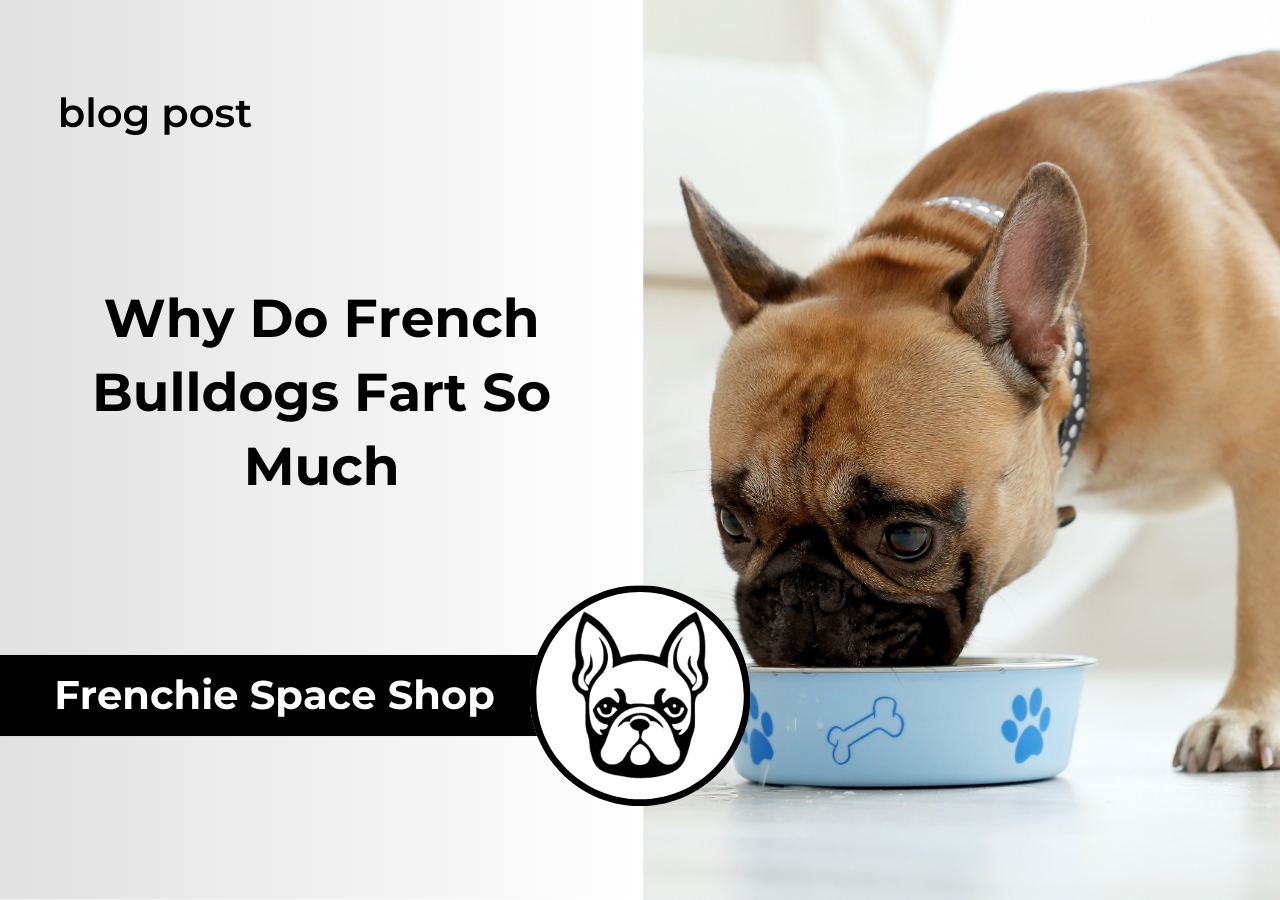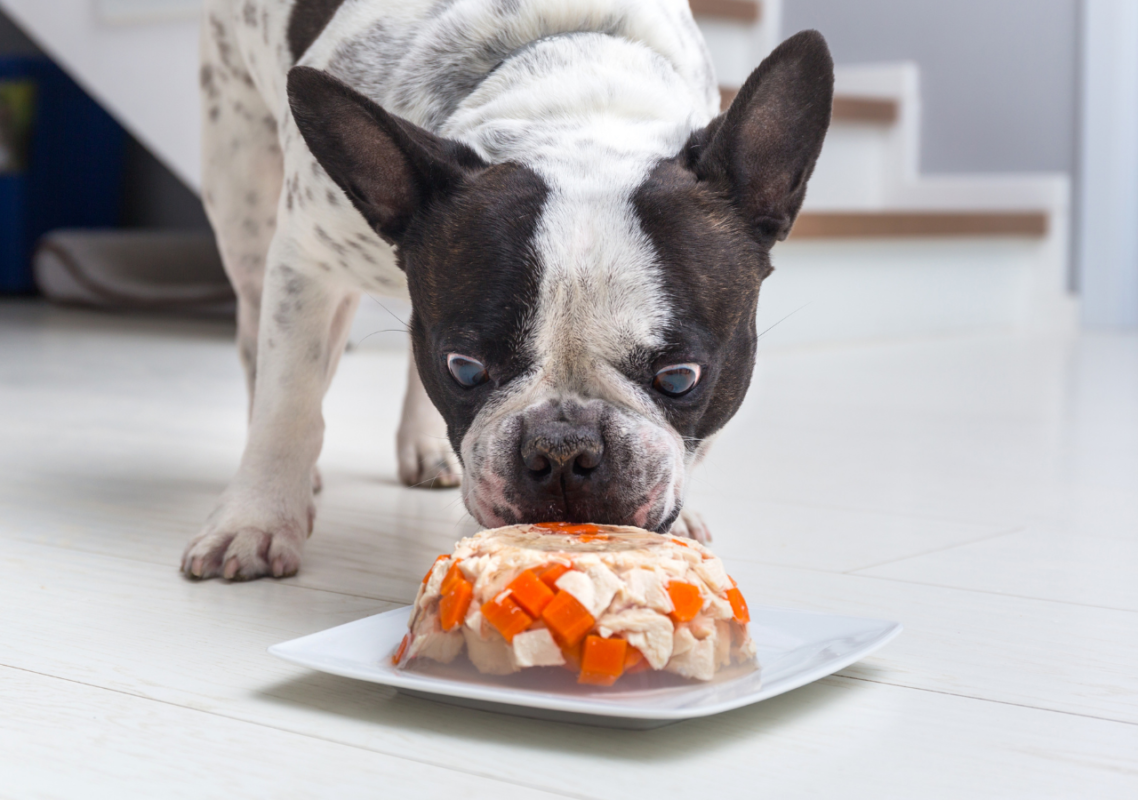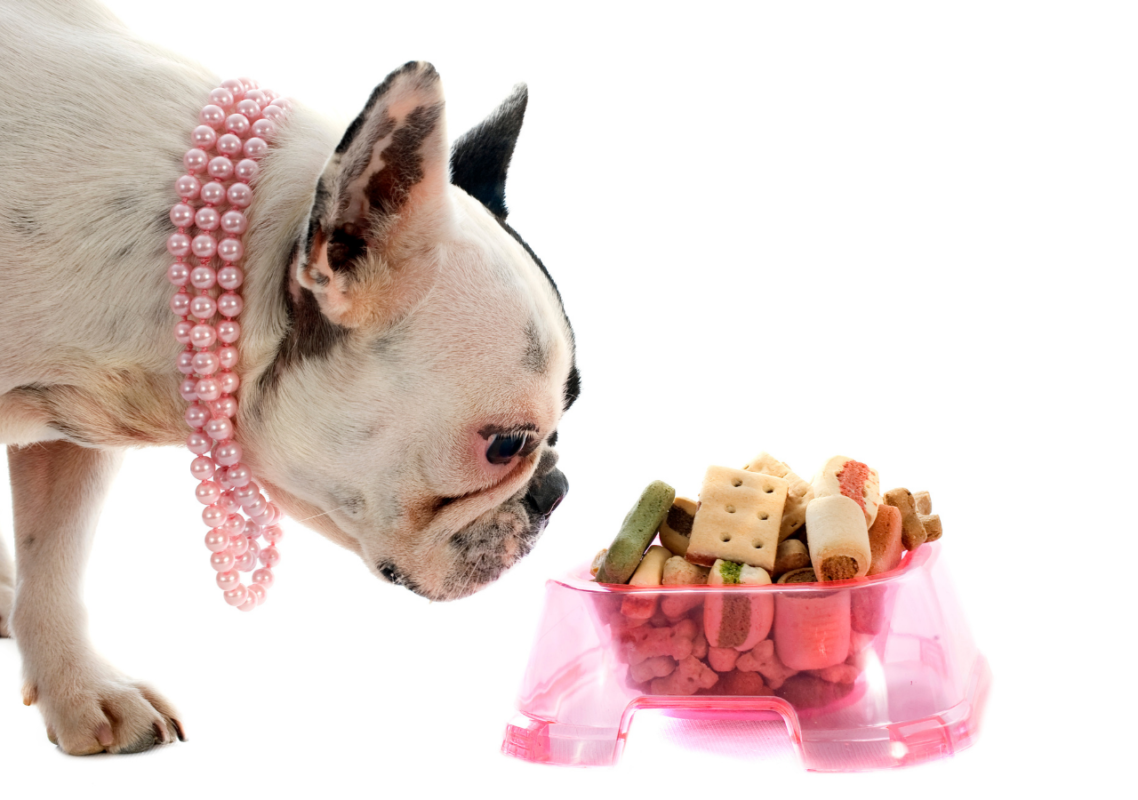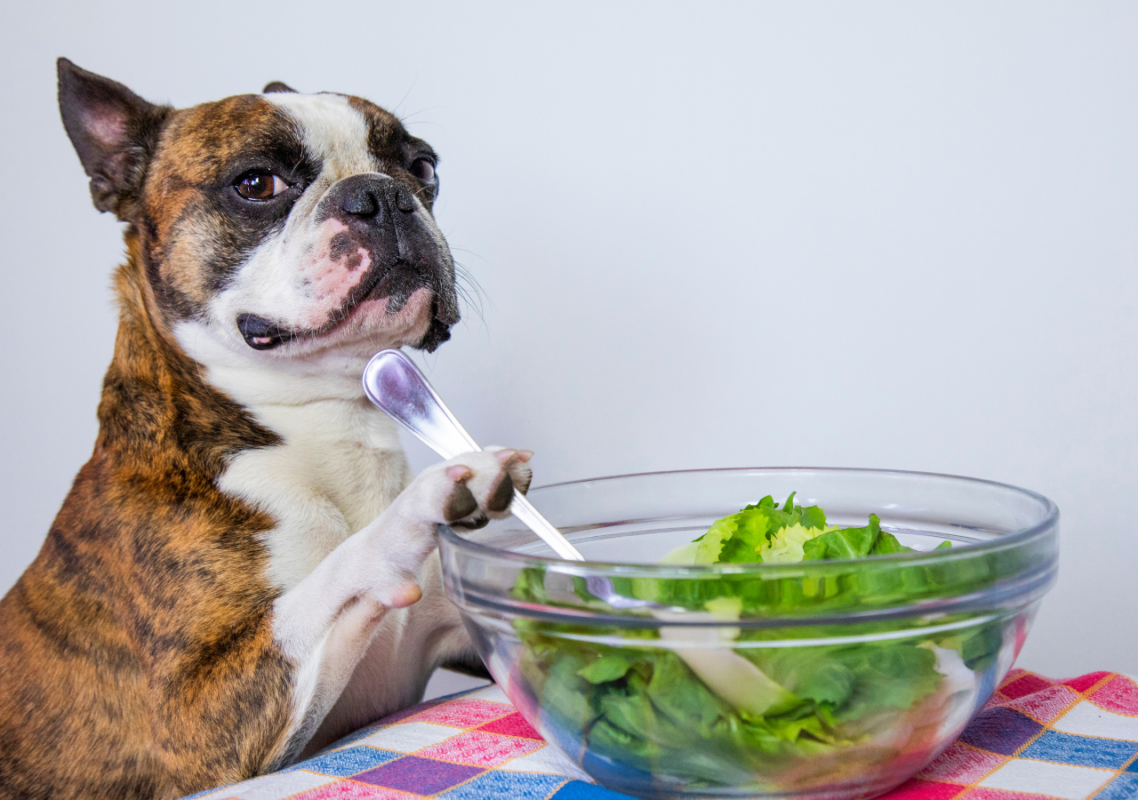Why Do French Bulldogs Fart So Much? 8 Main Reasons

If you’re the proud owner of a French Bulldog, you might have noticed a rather peculiar trait about these adorable pups – their tendency to fart quite frequently. It’s a common issue among Frenchie owners, leading many to wonder, “Why do French Bulldogs fart so much?” In this blog post, we’ll delve into the reasons behind the notorious flatulence of French Bulldogs, the food ingredients that contribute to this gassy predicament, and what you can do to reduce those unpleasant smells.
Why Are French Bulldogs Prone to Gasses?
French Bulldogs, affectionately known as Frenchies, are more prone to gasses compared to other dog breeds due to a combination of their unique physiology and certain dietary factors. Here are a few reasons why French Bulldogs fart so much:
- Brachycephalic Anatomy: Frenchies have a flat face and short nose, a condition known as brachycephalic. This anatomy causes them to swallow more air when they eat and drink, which can lead to increased gas production.
- Sensitive Digestive Systems: French Bulldogs often have sensitive stomachs and digestive systems, making them more susceptible to gas formation from certain foods.
- Allergies and Food Intolerances: Many Frenchies have food allergies or intolerances that can lead to digestive upset and increased flatulence.
- Lack of Exercise: French Bulldogs are not the most active breed, and their lack of exercise can slow down their digestion, leading to more gas.
What Food Ingredients Lead to Excessive Farts in French Bulldogs?
Diet plays a significant role in the flatulence of French Bulldogs. Certain food ingredients are notorious for causing gas in dogs, especially in breeds with sensitive stomachs like Frenchies. Here are some common culprits:
1. Beans and Legumes
Beans, lentils, and other legumes are high in fiber and can be difficult for Frenchies to digest. These ingredients can ferment in the stomach, leading to excessive gas.
2. Dairy Products
Many dogs, including French Bulldogs, are lactose intolerant. Consuming dairy products like milk, cheese, and yogurt can result in bloating and gas.
3. Grains
Grains such as wheat, corn, and soy are common allergens and can cause digestive issues in Frenchies. They can also lead to the production of gas due to their fermentable fibers.
4. Fatty Foods
High-fat foods can be hard for French Bulldogs to digest, causing gastrointestinal discomfort and flatulence.
5. Certain Vegetables
Vegetables like broccoli, cauliflower, and Brussels sprouts are known to cause gas in dogs due to their complex carbohydrates.
6. Artificial Additives and Preservatives
In our quest to understand “why do French Bulldogs fart so much,” it’s essential to take a close look at the role of artificial additives and preservatives in their diet. Many commercial dog foods contain these ingredients to enhance flavor, extend shelf life, or improve the food’s appearance.
Common Artificial Additives and Preservatives in Dog Food
Understanding the specific additives and preservatives that can cause issues is crucial. Here are some of the common culprits found in commercial dog foods:
- Butylated Hydroxyanisole (BHA) and Butylated Hydroxytoluene (BHT)
These chemical preservatives are used to prevent fats in dog food from becoming rancid. However, they can cause allergic reactions and digestive disturbances in French Bulldogs.
- Ethoxyquin
Originally used as a pesticide, ethoxyquin is also found in some pet foods as a preservative. It can cause a range of health issues, including gastrointestinal problems that lead to gas.
- Propylene Glycol
Used to maintain moisture in semi-moist dog foods, propylene glycol can disrupt your Frenchie’s digestive system and contribute to excessive gas.
- Artificial Colors and Flavors
These additives are used to make dog food more appealing. However, they offer no nutritional value and can irritate the digestive tract, leading to flatulence.
- Sodium Nitrate/Nitrite
These preservatives are used to maintain color and flavor in meat products. They can cause digestive upset and contribute to gas production in French Bulldogs.
7. Soy Products
Soy is a common ingredient in many dog foods but can be tough on a Frenchie’s stomach, often resulting in increased flatulence. Besides, it can lead to severe allergies in your pooch and itchiness is only some of them.
8. Spicy Foods
Spices and seasonings can irritate your dog’s stomach and intestines, leading to more gas and discomfort. Since human food often contain high amounts of fat, spices and oils, we don’t recommend you to feed your Frenchie with your diet.
How To Decrease French Bulldog Farts?
While you might not be able to eliminate Frenchie flatulence entirely, there are several steps you can take to reduce the frequency and intensity of their farts:
1. Adjust Your French Bulldog’s Diet
Switch to a high-quality, grain-free dog food with easily digestible ingredients. Avoid foods that contain the common culprits mentioned above. Look for dog foods specifically formulated for sensitive stomachs.
2. Feed Smaller, Frequent Meals
Feeding your French Bulldog smaller meals more frequently can help improve digestion and reduce the amount of air they swallow while eating.
3. Introduce Probiotics
For French Bulldogs, introducing probiotics into their diet can be an effective way to balance their gut bacteria, improve digestion, and reduce gas. Given their sensitive stomachs and propensity for flatulence, probiotics can be a game-changer for Frenchies. By breaking down food more efficiently, probiotics help to improve nutrient absorption and reduce the formation of gas.
A healthy gut flora supports the immune system, making your Frenchie less susceptible to infections and illnesses. If your Frenchie has been on antibiotics or has suffered from digestive issues, probiotics can help restore the natural balance of gut bacteria.
4. Avoid Table Scraps
Human food can be a major source of farts in French bulldogs. Avoid giving your dog table scraps and stick to their designated dog food and treats. Your meal often contains spices, salt, and other harmful ingredients that can lead to gasses in your Frenchie. Therefore, the best thing you can do for your pooch is to stick to his/her regular diet. That’s how you’ll prevent it from allergy too.
5. Increase Exercise
Regular exercise can help stimulate your French Bulldog’s digestive system, reducing the buildup of gas. So, next time you take your little gremlin for a walk, make sure he burns calories by running, chasing, and jumping. Just like regular activity helps humans to deal with stomach flatulence, that’s how it helps your dog as well.
6. Monitor and Eliminate Allergens
If you suspect your Frenchie has a food allergy or intolerance, work with your vet to identify and eliminate the offending ingredient from their diet. For some Frenchies, the BARF diet seems like the best choice. It’s because raw meat and veggies are less likely to cause farts in your Frenchie.
7. Use a Slow Feeder Bowl
If you’ve ever watched your French Bulldog devour their food with the speed and enthusiasm of a vacuum cleaner, you’ll understand why using a slow feeder bowl can be a game-changer. French Bulldogs are known for their voracious appetites, and their eagerness to eat can lead to them swallowing a lot of air along with their food. This swallowed air is one of the primary causes of the excessive gas that Frenchies often produce. Here’s a deeper look into how slow feeder bowls work and why they are beneficial for your gassy pup.
How Slow Feeder Bowls Work
A slow feeder bowl is designed with built-in obstacles that make it more challenging for your dog to reach their food. These obstacles come in various shapes and patterns, such as ridges, mazes, or spirals. By creating barriers to the food, the slow feeder bowl forces your Frenchie to eat more slowly and methodically, rather than gulping down their meal in a few quick bites.
Benefits of Slow Feeder Bowls
- Reduced Air Intake: When Frenchies eat too quickly, they tend to swallow a lot of air. This air travels to their stomach and intestines, leading to bloating and gas. By slowing down their eating pace, slow feeder bowls significantly reduce the amount of air they swallow.
- Improved Digestion: Eating too quickly can overwhelm a dog’s digestive system, leading to indigestion and gas. A slow feeder bowl encourages your Frenchie to chew their food more thoroughly, which aids in the initial breakdown of food and promotes better digestion.
- Prevents Choking: Fast eating can sometimes lead to choking or gagging. The barriers in a slow feeder bowl ensure that your Frenchie takes smaller bites, reducing the risk of choking.
- Portion Control: Slow feeder bowls can help with portion control, as they prevent your Frenchie from eating too much too quickly. This is particularly beneficial for maintaining a healthy weight, which is crucial for brachycephalic breeds prone to breathing issues.
- Mental Stimulation: The challenge of navigating the obstacles in a slow feeder bowl can provide mental stimulation for your Frenchie. This added engagement can make mealtime more enjoyable and enriching for them.
Frenchie BOAS and Flatulence
BOAS, or Brachycephalic Obstructive Airway Syndrome, is a common condition in brachycephalic breeds like French Bulldogs. This condition affects their breathing and can exacerbate issues with gas. When Frenchies struggle to breathe, they tend to swallow more air, which can lead to increased flatulence.
Managing BOAS
- Regular Vet Visits: Keep up with regular veterinary check-ups to monitor and manage BOAS.
- Weight Management: Ensure your Frenchie maintains a healthy weight to reduce the strain on their respiratory system.
- Avoid Stress and Overheating: Minimize situations that cause your Frenchie to overheat or become overly stressed, as this can worsen their breathing and gas issues.
READ ALSO: How To Choose The Best French Bulldog Harness? 5 Best Picks
Why Do French Bulldogs Fart so Much? Final Thoughts
French Bulldogs are lovable companions with a unique charm, but their flatulence can be a bit of a challenge. Understanding why French Bulldogs fart so much and taking steps to manage their diet and lifestyle can significantly reduce the frequency and severity of their gassy episodes. By making a few adjustments to their diet and routine, you can help your Frenchie live a more comfortable (and less smelly) life.
If your Frenchie’s gas seems excessive or is accompanied by other symptoms like vomiting, diarrhea, or a lack of appetite, it’s essential to consult your veterinarian to rule out any underlying health issues. With the right care and attention, you can keep your French Bulldog happy, healthy, and as gas-free as possible.








 French Bulldog Jackets & Coats
French Bulldog Jackets & Coats French Bulldog Dresses & Skirts
French Bulldog Dresses & Skirts French Bulldog Hoodies
French Bulldog Hoodies French Bulldog Sweaters
French Bulldog Sweaters French Bulldog Shirts
French Bulldog Shirts French Bulldog Pajamas
French Bulldog Pajamas French Bulldog Costumes
French Bulldog Costumes French Bulldog Life Jackets
French Bulldog Life Jackets

 French Bulldog Collars
French Bulldog Collars French Bulldog Harness
French Bulldog Harness
 French Bulldog Backpacks
French Bulldog Backpacks







